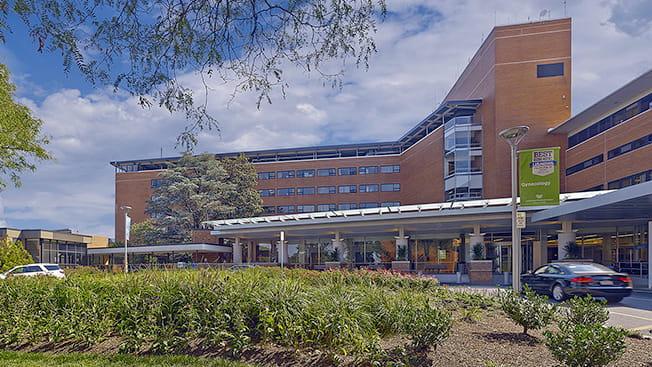With own invention, Main Line Health’s COO/Chief Nursing Officer leads fall-injury-prevention efforts

Main Line Health is among the national leaders in preventing falls among patients that result in significant injury, with fewer than two falls per 1,000 patients annually. But when falls do happen, the results can be deadly. Studies show patients ages 65 and over who fracture their hip have a 50% increased mortality risk over 12 months.
Barbara Wadsworth, COO and Chief Nursing Officer at Main Line Health, has brought more to bear against fall prevention than just her leadership ability. She has invented a fall-injury-prevention device herself.
Main Line Health has applied for a patent for Wadsworth’s portable airbag/cushion-deployment device with a sensor that would detect if a patent is falling. The compact device could be mounted or placed in front of a patient in the bathroom, with use of a bedside commode or other high-risk areas for falls.
“Even with our low rate, if it’s your loved one who falls and breaks their hip, we feel terrible about it and we want to fix the problem,” she said.
Medical devices and software by Wadsworth and fellow staff members across Main Line Health are being developed and commercialized by a joint venture called Lankenau Ventures—formed in March 2021 by the Lankenau Institute for Medical Research (LIMR; part of Main Line Health), Early Charm Ventures and L2C Partners. Lankenau Ventures’ efforts complement LIMR’s longstanding acapreneurialTM (academic/entrepreneurial) efforts to license biotech developments, drug candidates and blood assays created by Main Line Health employees and spin off companies to develop them. Licensing of Wadsworth’s invention for further development and eventual production is expected to occur shortly.
In 2019, when the initiative to develop devices and software was first conceived, George Prendergast, president and CEO of LIMR, and L2C Partners founder Merle Gilmore approached Wadsworth. They asked whether she believed Main Line Health nurses had ideas to improve patient care from daily experience that could become patentable inventions. She not only said they did but mentioned her own idea.
Said Wadsworth: “I started describing it and Merle said, ‘Stop, that’s an invention.’ I said, ‘It is?’ Who knew I was an inventor?”
“This invention is not something that will only help Main Line Health,” she added. “This is something that could help any hospital across the country. Knowing there’s over 5,000 acute care hospitals, I think this could be something very meaningful to patients and families.”
Injuries and death due to falls are a serious challenge to every hospital. An estimated 1 million falls occur in North American hospitals annually. They also are a high cost. Patients who sustain a fall in the hospital incur $13,000 in additional costs on average. Since the Centers for Medicare and Medicaid implemented its “no-pay policy,” hospitals are responsible for all fall-related costs.
Main Line Health, which has System Magnet® designation from the American Nurses Credentialing Center—widely accepted as the nation’s gold standard—has some of the nation’s best numbers when it comes to falls. For example, the 2021 first-quarter rate for its largest hospital, Lankenau Medical Center, was 1.35 falls per 1,000 patient days—40% lower on average even than other Magnet hospitals.
Wadsworth views her device as insurance. Patients considered a fall risk are supposed to be accompanied at all times by a staff member in the bathroom. But patients can and often do refuse the help because they want their privacy. Her device would prevent injury if they do fall.
“People don’t realize the risk of a fall when they’re taking new medications, recovering from surgery, or just having sleep deprivation while in the hospital,” Wadsworth said. “I remember one time I had to tell a family that their loved one was about to die from complications following a fall. I don’t want our staff members, or anyone’s family member, to have that conversation if we can help it.”
Wadsworth isn’t even the only Main Line Health executive to invent a fall device. Jeshahnton Essex, regional vice president for administration for Bryn Mawr and Paoli Hospitals, created the Essex privacy screen. Main Line Health filed a patent application in 2021.
Wadsworth received her Doctorate in Nursing Practice, Health Systems Leadership, from Vanderbilt University in 2014. She is also certified as a Nurse Executive, Advanced; a Fellow in the American Academy of Nursing; and a Fellow in the American College of Healthcare Executives.
About L2C Partners
L2C Partners, founded in 2015 by Merle Gilmore, offers institutions and research organizations expert outsourced technology transfer and commercialization services. With extensive experience in commercialization, research, and higher education, L2C Partners is powered by veteran business and tech transfer executives and optimizes the opportunity posed by an existing gap in the life sciences / technology / manufacturing ecosystem. For more information, visit www.L2Cpartners.com.
About Early Charm
Early Charm is a venture studio based in the Charm City (Baltimore) that creates, owns and operates companies in four different industry verticals: Advanced Materials, Drug Discovery, AG Tech and Engineered Products. Early Charm continuously engages with industry to identify current market needs. Once those market needs are assessed, we source cutting-edge technologies that fulfill those needs and develop and commercialize the resulting products and services.
About Lankenau Institute for Medical Research
Lankenau Institute for Medical Research (LIMR) is a nonprofit biomedical research institute located on the campus of Lankenau Medical Center and is part of Main Line Health. Founded in 1927, LIMR's mission is to improve human health and well-being. Using its ACAPRENEURIALTM model that integrates academic and entrepreneurial approaches, faculty and staff are devoted to advancing innovative new strategies to address formidable medical challenges including cancer, cardiovascular disease, tissue regeneration, gastrointestinal disorders and autoimmune diseases such as diabetes and arthritis. LIMR's principal investigators conduct basic, preclinical and clinical research, using their findings to explore ways to improve disease detection, diagnosis, treatment and prevention. They are committed to extending the boundaries of human health through technology transfer and training of the next generation of scientists and physicians.